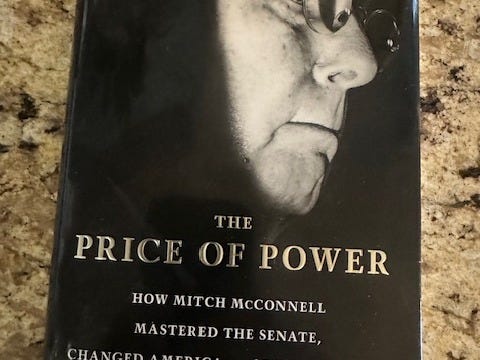"The Price of Power," A Book Review
Michael Tackett's biography of outgoing Senate GOP Leader Mitch McConnell is a superb reminder that politics is the art of the possible.
I spent my New Year’s Day reading a 350-page book, cover to cover. You?
No, not because of any silly resolutions, although one of my objectives this year is to return to reading more books and spending less time on social media. I’m so far behind on listening to or reading books, and I especially promised book reviews to several friends who have published terrific books in recent months.
I will dedicate most of January to them, including “Fixing Congress: Restoring Power to the People” by long-time friends and former Capitol Hill colleagues Mike Johnson and Jerome Climer. It is the quintessential book about Congress and a fabulous read. I also read “From Conflict to Convergence” by Rob Fersh, another great friend, and Mariah Levison, who leads the Convergence Center for Policy Resolution. Lastly, I will share a review of “To Stop a Tyrant” by my friend and Congressional Management Foundation co-founder Ira Chaleff, a very valuable must-read for anyone who works in government at any level. It even applies in the corporate world. It follows up his first seminal works, “Courageous Follower” and “Intelligent Disobedience.”
All three are very timely for different but not unrelated reasons. Since US Sen. Mitch McConnell—the longest-serving US Senate party leader in history—officially departs at noon today from his historic 18-year leadership position, “The Price of Power” by Michael Tackett, the Deputy Washington Bureau Chief for the Associated Press, will lead the parade of reviews. McConnell will continue as Kentucky’s senior US Senator through 2026 but has vacated the Capitol’s Howard Baker Rooms for his successor as Senate GOP and Majority Leader, John Thune (R-SD).
The subtitle is important: “How Mitch McConnell mastered the Senate, changed America, and lost his party.” While our political parties have realigned over the past 50 years, since Watergate and even before, I don’t agree that McConnell “lost his party.” He may not have triumphed over it like Donald Trump, in many ways his polar opposite, and he might not like some of the consequences. Still, his first successful political contest almost 50 years ago in Jefferson County, Kentucky, home to the Commonwealth’s largest city (and its most Democratic-leaning), Louisville, suggests he had a hand in changing its trajectory.
That he helped change America is not in doubt.
The definitive biography of McConnell’s remarkable career begins with his life story. In many respects, McConnell’s humble beginnings in Five Points, Alabama, are the quintessential Horatio Alger story. Perhaps his most consequential legacy, aside from helping change the composition of the US Supreme Court to a 6-3 “conservative” majority, is his remarkable staff. McConnell always had a penchant for spotting and recruiting some of Congress's brightest and most loyal staff. One of the country’s best and most-followed political podcasts, Ruthless, features several former McConnell staff who continue to influence the outcome of elections.
Equally talented and noteworthy is his long-time leadership chief of staff, Sharon Soderstrom, a long-time Senate leadership aide with whom I worked as a Senate official.
What makes the book remarkable is that McConnell cooperated with Tackett while exerting no editorial control. While Tackett demonstrates sympathy with his subject as most biographers do, he assumes the role of a clear-eyed and occasionally critical journalist. That makes the book especially valuable for historians and politicos alike. “He (McConnell) plays the power game,” Tackett wrote, “and has done so longer and more effectively - at times nobly, at times destructively - than any American political actor in this century.”

“For much of his time as one of the most powerful politicians in America,” Tackett writes in the forward, “Mitch McConnell has been a sphinx, saying little, revealing less, all the while making strategic and tactical considerations to outwit and outlast his opponents.
“I knew this when I approached Senator McConnell in March 2021 about writing this biography, and my expectations, accordingly, were modest. We had never spoken before. Perhaps he would say he would consider it, I thought. Instead, halfway through our first hour-long meeting, he surprised me by agreeing to cooperate and give me access to his vast personal archive: thousands of pages of personal letters, official correspondence, family photos, medical records, and a richly detailed oral history covering each year of his life and career, which he began recording in 1995. It was if, even as a young man, he knew - or rather hoped - that one day his life would be examined. As I began my research, it became clear to me that this was true.”
The book parallels but delves deeper than McConnell’s memoir from 2016, “The Long Game.” McConnell contracted the polio virus as a two-year-old only child. His father fought in World War II, and his mom would take him to Warm Springs, Georgia, the same place fellow polio sufferer and President Franklin Roosevelt sought treatment and eventually died there. McConnell carries to this day the consequences of the polio infection in his left leg, having taken a few injurious spills in recent years, one of which resulted in a severe concussion.
I’ve had a front-row seat for nearly all of Senator McConnell’s career, and I'm proud that one of my former Senate staff worked for him in leadership. As regional political director for the National Republican Congressional Committee in 1984, I helped elect vulnerable House GOP incumbents that year (not a heavy lift during that year’s Reagan landslide). I also paid careful attention to other races around the country, as all political junkies did.
Nobody, and I mean nobody, thought McConnell had a chance when he began his quixotic race for the US Senate that year against a popular incumbent, US Sen. Walter “Dee” Huddleston (D-KY). Certainly not the Chairman of the National Republican Senatorial Committee at the time, Senator Richard Lugar (R-IN), nor his executive director, future Bush White House budget aide and two-term Indiana Gov. Mitch Daniels. Like most southern states at the time, Kentucky was still heavily Democratic, even as cracks began to appear in the nation’s political alignment around that time. McConnell was the upset winner five years earlier as Judge-Executive for Jefferson County, Kentucky (Louisville). McConnell upset an incumbent and then was narrowly reelected four years later. However, as a former aide to Kentucky’s former GOP US Senators, John Sherman Cooper and Marlow Cook, he had long set his sights on the US Senate.
Tackett expertly describes that famous race, in which McConnell trailed by as much as 40 points a few months before the elections. However, with help from Roger Ailes and Larry McCarthy (who is not mentioned in the book, but I know better), conceived ads that dramatically shifted the race and led to a narrow McConnell victory.
Tackett outlines how superb research by campaign manager Janet Mullins, who would later become his chief of staff and Ford Motor Company’s chief lobbyist in Washington, led to the “bloodhounds” ad. In those days, Senators could accept honoraria for speeches to keep their official salaries low. Mullins discovered Huddleston missed votes while giving paid speeches in charming venues. Mullins, who became a friend, died of pancreatic cancer in 2023.
Huddleston believed his polls, never responded, and paid a price for McConnell’s tenacity, patience, and brilliant calculations. Lugar’s and Daniels’ NRSC paid careful attention and came through with cash and support.
In 1990, I was at the National Republican Senatorial Committee, and again, I was responsible for the campaigns of several vulnerable US Senators. One of whom was first-term incumbent Mitch McConnell. I made several trips to Kentucky and befriended McConnell’s campaign manager, Steven Law, a Columbia-trained attorney who had also worked on his Senate staff. I learned quickly I didn’t need to worry much about McConnell, who, with Law, ran the best campaign in the nation against his opponent, former Louisville Mayor and Dr. Harvey Sloane. I ensured they had all the financial and logistical support they needed and stayed out of their way.
Instead, I would spend considerable time in South Dakota working with a young state GOP executive named John Thune to help reelect endangered US Senator Larry Pressler.
It’s hard to believe that was 40 years ago. McConnell, 82, is in the final two years of this 7th and likely final term.
McConnell’s margins of victory continued to improve throughout his political career despite having some impressive and celebrated Democratic opponents. Since 2016, he has raised and " invested” over $1 billion to help elect and reelect his colleagues through the Steven Law-run Senate Leadership Fund. However, in his last race, Amy McGrath, a Naval Academy graduate and the first woman to serve as a Marine combat aviator, including dangerous missions over Iraq and Afghanistan, outspent him.
“When she learned that women were not allowed to fly in combat, she wrote to elected officials in Washington, including McConnell, to ask why. He never replied. And she never forgot,” Tackett wrote. McConnell still won by double digits. The political graveyard is full of people who ran against Mitch McConnell - none of them have resurrected their political career.
The book walks through McConnell’s assent through leadership with tenacity and patience. He would lose his first two contests for Chairman of the National Republican Senatorial Committee before finally winning on the third try. McConnell ascended to become the Assistant GOP Leader (Whip) during the tumultuous post-2002 election when Senators replaced Trent Lott (R-MS) with Dr. Bill Frist (R-TN) as their floor leader after Lott made controversial remarks at a 100th birthday party for US Sen. Strom Thurmond (R-SC). When Frist retired after the 2006 elections, McConnell moved into the role he vacates 18 years later, today.
McConnell’s legislative history is fascinating. He didn’t seem to come to Washington with a particular issue or policy expertise but soon grasped campaign finance reform. While he began his political career supporting the elimination of Political Action Committees and other reforms, he morphed into a champion of free speech. He vociferously opposed the McCain-Feingold campaign reform bill that President Bush eventually signed into law and mostly survived court challenges. McConnell championed the notion that political spending was speech and should be celebrated and protected, which the Supreme Court has largely affirmed.
A key to McConnell’s rise was his willingness to take jobs no one wanted, including starting his Senate career as chair of the Select Committee on Ethics. He quickly found himself immersed in the case of Senator Bob Packwood, who had been accused of sexual harassment. McConnell and the committee would eventually recommend expulsion after Packwood was found altering his records to cover up his abuses. Packwood resigned, triggering a special election won by Ron Wyden (D-OR), who remains in office.
McConnell’s legacy will be cemented by his handling of the Supreme Court vacancies, starting with Antonin Scalia's death in February 2016. McConnell famously cited the “Biden rule,” named after then-US Senator and Judiciary Committee member Joseph R. Biden Jr., resulting from a 1992 speech he delivered on the US Senate floor. It wasn’t a “Senate rule” or even a precedent, but no matter. It was politically convenient.
In that speech, Biden announced that if there were a Supreme Court vacancy during the 1992 presidential election year (there wasn’t), President George H. W. Bush should not submit a nomination. He cited the reality that the Democratic-controlled US Senate was of a different party than the President as one reason. McConnell, very aware of history, pounced.
President Obama eventually nominated DC Circuit Court of Appeals Judge Merrick Garland, who arranged a few meetings with US Senators. However, Judiciary Chair Chuck Grassley (R-IA) refused to hold hearings. With Trump’s upset win, he would nominate 10th Circuit Court of Appeals Judge Neil Gorsuch, whose nomination was filibustered by Democrats, an unprecedented action. Following the precedent of his successor, Harry Reid (D-NV), McConnell triggered the “nuclear option” and ended the supermajority filibuster rule for Supreme Court nominees.
When Reid first exercised the nuclear option for executive and most judicial nominees (excluding the Supreme Court) in 2013, McConnell, then the Minority Leader, warned him that he would rue the day.
McConnell would continue to push two more Trump nominees through contentious confirmations, including Brett Kavanaugh in 2018 and, just before the 2020 election, Amy Coney Barrett following the death of Ruth Bader Ginsberg. When Democrats tried to remind McConnell of the “Biden rule” argument he made to keep Scalia’s seat open in 2016, McConnell quickly reminded them that it applied only when the President’s party differed from that of the Senate’s majority. That wasn’t the case in 2020.
Tackett sometimes criticizes McConnell for taking on issues he wasn’t serious about or believed in. McConnell confirms animus toward Trump (and a few others), especially following January 6th, 2021, which also rankled Tackett. McConnell believed then, and perhaps still does, that Trump was unfit for the presidency. However, McConnell, ever the party loyalist and a realist, endorsed Trump’s candidacy in 2024. During last year’s GOP convention in Milwaukee, McConnell announced Kentucky’s unanimous support for the Trump-Vance ticket, even as both had been critical of McConnell and remain apart on issues such as support for Ukraine. McConnell was booed by other delegates anyway.
McConnell’s votes for some of Trump’s more controversial Cabinet nominees will be interesting to watch, now that he’s no longer moored to the responsibilities of leadership.
Aside from his tenacity, preparedness, strategic thinking, mastery of Senate rules and history, and fundraising prowess, McConnell is most respected for being an outstanding listener and careful with his words. Unlike Trump, he doesn’t care what anyone thinks about him and rarely seeks the limelight. That’s a rare trait in an institution where the most dangerous place to be is between a Senator and a microphone.
While I’ve run into Senator McConnell several times over our careers, I remember one particular one-on-one meeting in late 1996.
I was the outgoing Secretary of the Senate, and new Leader Trent Lott sought to bring on his person, Gary Sisco, as my replacement when the 104th Congress ended. Just before he resigned from the Senate that summer, Senator Dole nominated me for a GOP seat on the Federal Election Commission. “Senator McConnell wants to see you,” my assistant told me. He was the only Senator who’d expressed interest in my nomination, which was finally sent to the Senate that fall after some interesting machinations that I’ll outline someday, involving not one but two full field FBI investigations. Sen. Wendell Ford (D-KY), ranking Democrat on the Senate Rules Committee, which has jurisdiction over the FEC, was fully supportive of my nomination.
I scampered over to his Russell Senate Building office. McConnell, the Senate’s leading election law expert, wanted to sign off on Dole’s nominee. After I told him that my philosophy was to enforce existing law as written and intended by Congress and no more, he said, “You’re my kind of guy. “ He smiled, expressed his support, and wished me luck.
I later withdrew my nomination to scuttle then-Democratic Leader Tom Daschle’s desire to trade seven Clinton judicial nominations for my nomination and one other as a more attractive private-sector job awaited me. Still, McConnell and I continue our association to this day, and I see him often around the Senate and at various fundraisers.
I know that it is unfashionable among Trump supporters to say nice things about Mitch McConnell. Nobody’s perfect, and neither is Senator McConnell. He admits as much throughout the book. But he’s the most consequential and effective Senate GOP leader of my lifetime. That is simply a fact. And like it or not, he’s responsible mainly for ensuring the confirmation of three Trump nominees on the Supreme Court and much more from Trump’s first-term agenda. Trump supporters who expect members of Congress to bend their knee to every Trump whim have never learned a basic fact - that Congress is a separate and coequal branch of government. Senators and House members are accountable to their voters, not the President of the United States.
As the late Robert C. Byrd (D-WV), a former Senate leader, once said, “I never served under any president; I served with them.”
Tackett’s riveting and inspirational book is a valuable contribution and a must-read if you are interested in modern political history and the remarkable and relentless rise of a humble polio survivor from Five Points, Alabama.







loved the book reviews